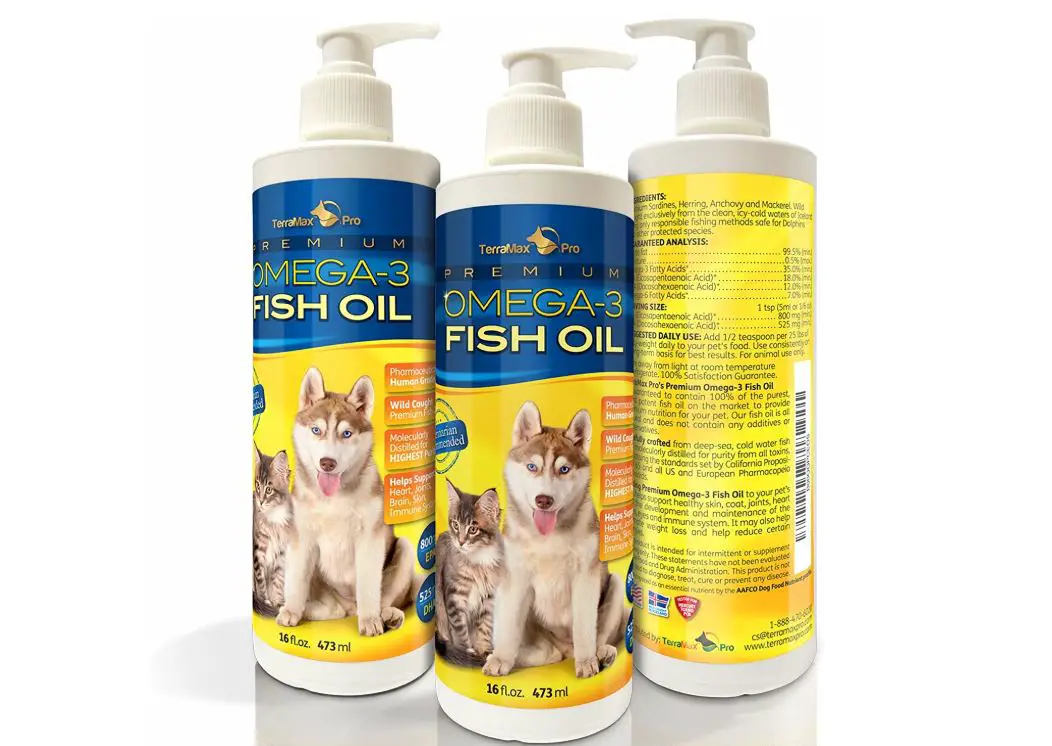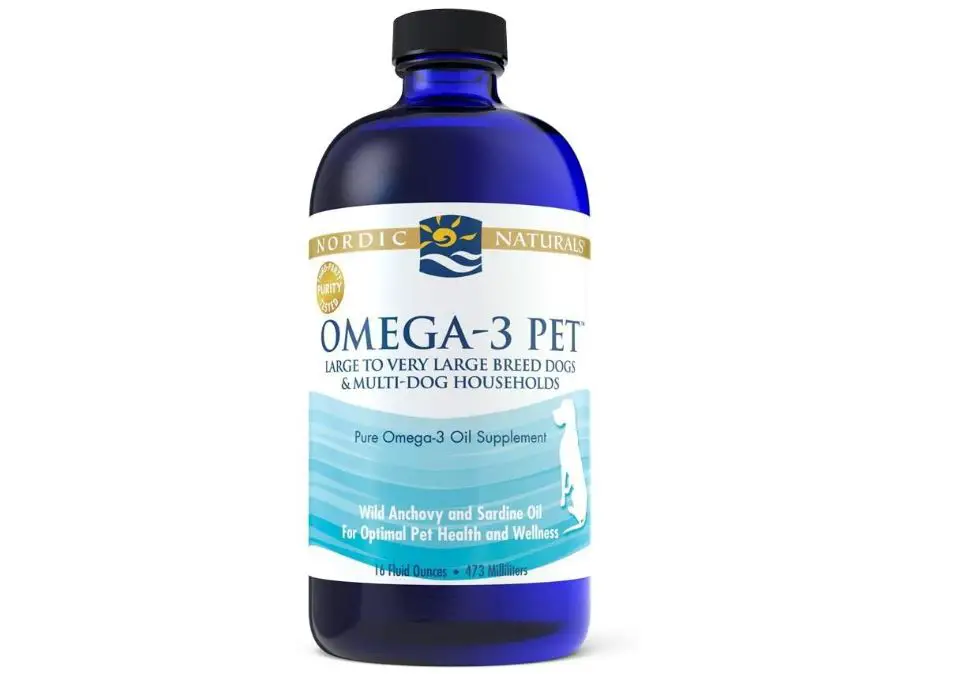Benefits Of Fish Oil For Dogs – Must Read Guide

You probably have heard of the advantages of fish oil for people, but have you read about the benefits for your dog?
For your dog, the most common supplement which can be added to his diet is fish oil. It comes from salmon, mullet, tuna, bluefish, sardines, herring, trout, and anchovies. It is an excellent source of needed omega-3 fatty acids.
Your dog has to have omega-3 fatty acids added to his diet because your furry family member can’t manufacture his own and while Omega 6 will be abundant in his diet anyway, Omega 3 fatty acids are a little bit harder to come by.
Why Fish Oil?
When you give your dog fish oil, it will support his health in various ways. Fish oil will promote a healthy coat, can reduce flaky and itchy skin, support your pup’s heart health and can relieve joint pain and relieve allergies.
Why Is Omega 3 The Most Important?
Omega fatty acids regulate blood flow and inflammation by creating necessary hormones. Omega fatty acids aren’t in the body naturally. But, Omega-3 can be found in shellfish, nut and plant oils, cold-water fish, and flaxseed.
Why Do Dogs Get Too Much Omega 6 Already?
Some dog food manufacturers make their dog food from refined oil or meat from corn-fed animals. By doing this, it creates an overabundance of Omega-6 fatty acids within the food being fed to your dog.
So, your furry friend ends up with too much omega-6 in his system and not enough Omega-3 fatty acids. Your dog needs a balance of both, not too much of one or the other.
Why Is an Omega 3 Supplement Important?
There are two omega-3’s in fatty fish oil, one is EPA, and the other is DHA. EPA will act as an anti-inflammatory for any condition that causes inflammation. It helps with arthritis, skin, kidneys, joints, and heart inflammation.
DHA the other omega 3, if essential for eye and brain development in puppies and kittens. You can also give fish oil to a pregnant or nursing dogs so the babies will benefit as soon as they are born.
The Omega-3 fatty acids help to promote neuron development as well as cell permeability and growing nerve cells.
Benefits Of Fish Oil
When you give your dog fish oil, it helps for as long as they live. Depending on how your pup’s general health is, fish oil supplements could be part of his daily diet. Or, it can just temporarily give a nutritional boost to your dog’s diet.
Heart
Since obesity is associated with chronic heart failure in dogs, your dog can lose weight while taking fish oil. A study was performed on dogs who had heart failure, some were fed fish oil, and some weren’t. The dogs who were getting the fish oil supplements had a longer survival rate and higher weight loss than the dogs that didn’t receive it.
Skin and Coat

Omega-3 naturally treats skin conditions because of the anti-inflammatory effects it has. It’s been proven that that fish oil is more effective on dogs who were in the early stages of skin issues rather than those who had the issue longer.
Decreased Shedding
Fish oil will reduce shedding because of the improvement in the coat softness and appearance.
Ease Allergies
By giving your dog fish oil, it will decrease itching, and the self- inflicted injuries he develops from scratching all the time. It will help with itchy skin, dandruff, and hot spots.
Ease Inflammation
If your dog is suffering from inflammation, giving him fish oil won’t treat it alone. But, if you combine it with other medications for inflammation, it could enhance the effect of the medicines. Always consult your vet before mixing medications.
Joints
Omega-3 fatty acids can help with the treatment of arthritis. If your dog has arthritis in his joints, then supplementing his diet with fish oil may help. Omega-3 fatty acids can make improvements in your dog’s ability to get up from a resting position, walk, and even play more comfortably.
Kidney disease

To fight kidney disease in your dog, fish oil can help to combat the symptoms. Excess loss of protein is one symptom and protects against acute injury in his kidneys. Plus, the mega-3 in fish oil will help to reduce glomerular disease, which will improve the kidney function in your pet. Studies show that fish oil is also an option to help treat kidney’s which are compromised.
Long Term Health
Fish oil can boost your pet’s health long term and be far-reaching. It can even help aid more severe health issues, such as cancer.
Brain Health
Canine Cognitive Dysfunction can develop when your dog becomes older. It resembles Alzheimer’s disease that people can get when they’re older. If you feed your pet a regular dose of DHA, which is in fish oil, it can improve the cognitive function of your pet.
Antioxidants Reduce the Risk of Health Problems.
Both EPA and DHA are part of cell membranes in dogs. To decrease inflammation, the combination of these two fatty acids act as signals. When your dog has less inflammation, it will lead to less redness, swelling, and pain in his joints, skin, or other organs.
What to Look for In Your Fish Oil Supplement?
There are three types of fish oil on the market you can choose from for your pet:
Natural triglyceride oil
This oil is the easiest to absorb and the most natural, but it might have contaminants in it because it isn’t purified. This form is often preferred because of its natural form, and it’s closer to eating real fish.
Ethyl ester oil
This oil is distilled and concentrated, which removes impurities. It’s more semi-natural with high levels of the components of omega-3, which are docosahexaenoic acid (DHA) and eicosatetraenoic acid (EPA). This form is the most common form on the market.
Synthetic triglyceride oil
This oil is synthetic and absorbs less than any of the three.
Before you choose which fish oil to give your dog, consider what his breed is, his size, his weight, and how his overall health is doing. Always talk to your vet first before adding any supplement to your pet’s diet.
How Long Does It Take to Work?

After figuring what is the target dose for your pet, you should see signs of improvement within three weeks. The signs would be better digestions, reduced anxiety, reduced itchy skin, and ease of movement if your pet has arthritis. You can double the dose if you don’t see any improvements.
Our Recommended Fish Oil Supplements
There are different types of fish oil supplements, but I recommend the following two:
TerraMax Pro Premium Liquid Omega-3 Fish Oil:

This fish oil doesn’t contain any artificial ingredients, for it’s appropriate for your pet. It is guaranteed to have at least 800 mg EPA and 525 mg DHA per recommended serving. It supports the fur, skin, joints, and overall health of your dog. It’s priced around $20, but the reviews say it’s worth the cost and works exceptionally well for dogs that have itchy skin and joint pain.
Check Out More Reviews Here:
Nordic Naturals Omega 3 Pet Supplement

Perfect for small dog breeds and made in the USA, it’s a supplement that is a dependable source of EPA and DHA. Reviews state the oil leaves their pets with a smooth and silky coat, and it’s priced at around $13.
Check Out More Reviews Here:
How Much Fish Oil Should I Give to My Dog? If you feed your dog too much fish oil, there can be side effects. The dosage should be between 20-55 mg combined with EPA and DHA per pound of your pet’s body weight. So, if you weigh your pet and then multiply the weight by 20 and it will give you the correct dose needed for EPA and DHA milligrams.
How to Store Fish Oil for Long Term Use?
One thing you want to do is to protect fish oil from light, heat, and air. Since the fish oil, if it is exposed to oxidation, can become rancid, toss it if it has an off odor. There’s less chance of that happening if the fish oil is stored in a dark bottle and placed in the refrigerator.
What Are the Side Effects of Fish Oil?
There are side effects of fish oil that you need to watch out for if giving it to your pet. Fish oil isn’t toxic, but your dog could have some uncomfortable side effects that can be prevented.
If your pet has a medical history of gastrointestinal issues, then slowly add the fish oil to your dog’s diet a little bit at a time. Don’t use the full dosage all at once, because your dog could get diarrhea.
Fish oil can also slow blood clotting because it can decrease the blood platelets from sticking together. So, don’t give fish oil to your dog if he is on a blood thinner. If your pet is on anti-inflammatory medication, talk to your vet before giving fish oil to your pet.
If your dog starts to have fishy smelling breath, just lower the dosage.
Can A Dog Overdose on Fish Oil?
No, but it can cause weight gain, diarrhea, and a lowered immune system. Consult your vet for the correct dosage of fish oil to give your dog.
Can I Give My Dog Human Fish Oil?
If your dog is ten pounds or smaller, you can use regular strength fish oil capsules for people. These capsules usually have just under 200 mg EPA per dose. If you can’t get your pet to take a capsule, you can give him liquid. Some dogs prefer human fish oil despite the lemon flavor.
Do Dogs Need Vitamin E with Fish Oil?
If you give your pet fish oil regularly, then you need to provide him with vitamin E too. Vitamin E is an important antioxidant and fat-soluble vitamin that is necessary. Your pet’s body will use up what it has stored of vitamin E when it processes the fish oil because fish oil oxidizes quickly.
Can I Give My Dog Fish Oil Every Day?

Most of the time if you feed a good quality dog food, your dog should be getting omega-3 fatty acids. But, if you think your dog could benefit from fish oil daily, talk to your vet. There can be side-effects, though, such as a mild oily coat.
Some dogs won’t eat a capsule, but you can pierce the capsule with a pin or use a small knife to cut it open. Then just squeeze it over your pet’s food when you feed him. If you need a large dose because you have a big dog, look for fish oil in liquid form for easier dispensing.
Where to Buy Fish Oil?
Since when you buy fish oil for your pet, it’s a nutraceutical, there aren’t any regulations by the FDA. You can purchase fish oil from any health store or online. There are various amounts of EPA and DHA that are in the supplement. So, it’s best to use a supplement that is recommended by your vet. You want to make sure that whatever you give your pet as a supplement has a sustainable marine source.
Questions to Ask Your Vet
If you are considering giving fish oil to your pet, there are some questions to ask your vet:
- What is the proper amount of fish oil I need to give my dog according to his weight?
- What is the best type of fish oil to give to my pet?
- If I give my dog fish oil, will it clash with any of his other medications he’s taking?
- Does my dog have a medical disorder that might benefit from fish oil supplements?
CONCLUSION
When you are trying to feed your dog, a healthy diet can be difficult with so many processed ingredients in dog food. By adding fish oil, it may be just the boost your dog needs for a shiny coat, healthy skin, and excellent all-over health. Just make sure to purchase only a high-quality product, so your pet stays healthy. For more on fish oil, click the link below:
reference:
https://www.petcarerx.com/article/fish-oil-for-dogs-and-cats-the-benefits-of-omega-3-for-pets/601
https://www.akc.org/expert-advice/nutrition/fish-oil-for-dogs/
https://www.redbarn.com/benefits-of-fish-oil-for-dogs/
https://www.petfinder.com/dogs/dog-nutrition/fish-oil-for-dogs/


